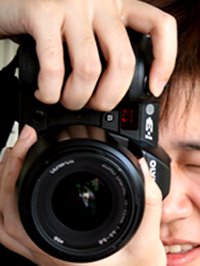There are two types of consumer cameras on the market -- SLR/DSLR cameras and "point-and-shoot"/Compact cameras.
- The main difference is how the photographer sees the scene.
- In a point-and-shoot camera, the viewfinder is a simple window through the body of the camera. You don't see the real image formed by the camera lens, but you get a rough idea of what is in view.
- In an SLR camera, you see the actual real image that the film will see. If you take the lens off of an SLR camera and look inside, you'll see how this works. The camera has a slanted mirror positioned between the shutter and the lens, with a piece of translucent glass and a prism positioned above it. This configuration works like a periscope -- the real image bounces off the lower mirror on to the translucent glass, which serves as a projection screen. The prism's job is to flip the image on the screen, so it appears right side up again, and redirect it on to the viewfinder window.

- When you click the shutter button, the camera quickly switches the mirror out of the way, so the image is directed at the exposed film. The mirror is connected to the shutter timer system, so it stays open as long as the shutter is open. This is why the viewfinder is suddenly blacked out when you take a picture.

- The mirror in an SLR camera directs the real image to the viewfinder. When you hit the shutter button, the mirror flips up so the real image is projected onto the film.
In this sort of camera, the mirror and the translucent screen are set up so they present the real image exactly as it will appear on the film. The advantage of this design is that you can adjust the focus and compose the scene so you get exactly the picture you want. For this reason, professional photographers typically use SLR cameras.
These days, most SLR cameras are built with both manual and automatic controls, and most point-and-shoot cameras are fully automatic. Conceptually, automatic cameras are pretty much the same as fully manual models, but everything is controlled by a central microprocessor instead of the user. The central microprocessor receives information from the autofocus system and the light meter. Then it activates several small motors, which adjust the lens and open and close the aperture. In modern cameras, this a pretty advanced computer system. - Automatic point-and-shoot camera use circuit boards and electric motors, instead of gears and springs




